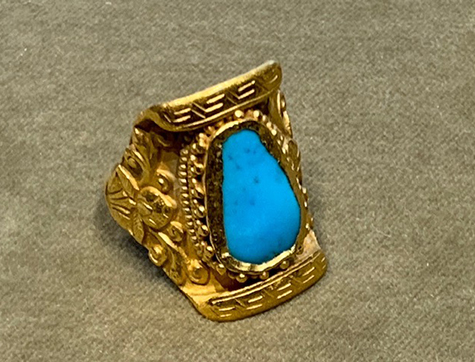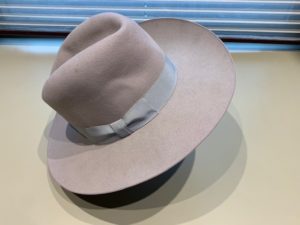My husband Michael and I fell in love at first sight, and for fifty years I’ve always told the story about that afternoon the same way. We met by chance. He’d been asked to give a lift to a college friend of mine who had been invited to the same out of town wedding. On their way home, they’d stopped to visit me at my parents’ country house, where I was recovering from jaw surgery. My friend called to warn me, “The guy I’m with is a dork, but he’s willing to make the detour.”
Michael arrived looking remarkable in a baby-blue suit and matching fedora, not to mention the huge turquoise ring he’d bought in Nepal on a medical fellowship—it was ‘69, after all. And I? My head was wrapped like a mummy’s except for a little oval of face from forehead to upper lip. And I couldn’t talk. Though enthralled by his travel tales, which may never before have received such rapturous attention, I remained necessarily mute. Whatever passed between us, though, was enough. As Michael and my friend were leaving, she whispered to me, “Thanks for showing me what a terrific guy he is!” Too late. He kissed me goodby, and I could feel the spot on my forehead for hours.
I’ve always ended the story laughing about how Michael fell for me under false pretenses, not knowing what a talker I am. Only very recently have I been struck with the realization that there’s another side to the story I’ve managed never to notice.
The question of what predisposes us to fall for a particular person was taken up for serious study by Helen Fisher, the biological anthropologist and love expert, who developed the theory of the unconscious “love map,” which is created in each of us by a combination of our neurology and early experiences. What drives the dynamic between romantic couples has innumerable variations. We may seek a partner who tolerates anxiety the way we do, who has some strength that can compensate for some weakness in us, someone who we think loves something particular in us, a mate similar to the parent with whom we have unresolved childhood issues, and on and on.
I favor the idea that what determines which of these patterns best fits each of us is its ability to satisfy our single most essential need. I think that’s what we mean when we say that the person we are in love with “completes” us. When you both get that feeling simultaneously, you’re off and running. You have what to work with—because love and marriage are definitely work!
Of the many possibilities, the one that best fit Michael and me was the one about “unresolved childhood issues” with a parent. To be clear, this dynamic does not lead to a search for the opposite of the toxic parent, such as someone who is giving, when the parent was withholding. A simple inversion of the parental dynamic has no appeal at all. It can even be a turnoff; an admirer with the flip side of the hated traits can seem insincere or boring. Instead what you want is a partner with whom you can relive the every-single-day-of-your-childhood pain so that you can fix it, once and for all, again and again. In this way you can continuously and actively triumph over your sad history—just as you’d always wished you could. Your effort is what brings the deep satisfaction and makes the reenactment real.
In Michael’s case, he had to fight constantly for the love of his accomplished and vivacious mother, because she pitted him and his twin brother against one another. And because they had to share everything—sleeping together in one of their two rooms and studying together in the other—there was no escape from each other’s archenemy. Michael, the good-behaving son, worked hard in the shadows, while his misbehaving brother caused the uproar and got the attention.
What Michael, then, most needed was a woman who would focus on him, but someone with competing interests, someone whose notice he would have to earn. He claims to have had no trouble reading in my face my run-away curiosity and a familiar vivacity. It didn’t hurt that my college friend had initially failed to appreciate him.
In my case, my mother was also the problem. An aggressive executive who turned over my care to a live-in nanny, she saw her role as child-fixer, counting the “you know”s when I spoke at the dinner table, pouncing on my imperfect pronunciation. Fixated on the surface, she never got to the underlying thoughts. An instinct for self-preservation kept me quiet.
What did I, then, most want in a partner? I never actually stopped to wonder! The story of Michael’s fateful visit was polished to perfection, and I never considered that it might be incomplete. Only very recently did the question of my need come up, when a friend volunteered his most profound childhood yearning and his wife’s ability to satisfy it perfectly. The instant my friend asked, though, I knew the answer: I needed a man I could get to listen to me!
At which point, it suddenly dawned on me, could it possibly be a coincidence that I fell in love with Michael when I couldn’t speak? The afternoon we met, he did all the talking—while I once again, and in my parent’s home, swallowed my thoughts. Michael, however, didn’t view me critically; in fact, his approval was palpable. Michael lit up in response to my fascination with him, and I lit up in response to the love in his eyes. Here was my chance to relive my childhood anguish and to repair it! Michael and I shared a lot: a hunger for experience, for travel, for learning, for trying new things, and a similar background. But what clinched the deal for both of us was returning at that moment to our key struggles, which we sensed this time we could finally win.
And so I came to see, in a flash, that it was probably not Michael who was fooled by my silence. Instead, for all these many years, it is I who have failed to see that my being unable to speak when we met was the very thing that made Michael’s love irresistible.


I have read this charming story a number of times and it never fails to delight me. Beautifully written with all the elements of a unique love story.
Actually, this is a different story! It’s a big piece I’d always ignored: my side of what happened!
Cousin, your writing grabbed us. We teared up at your journey and thrilled at the triumphs of insight and completion. We just purchased your book and can’t wait to dive in. Stay well and let’s visit when COVID is under control!
Thank you, thank you! Let’s hope it won’t be too long before we can be together.